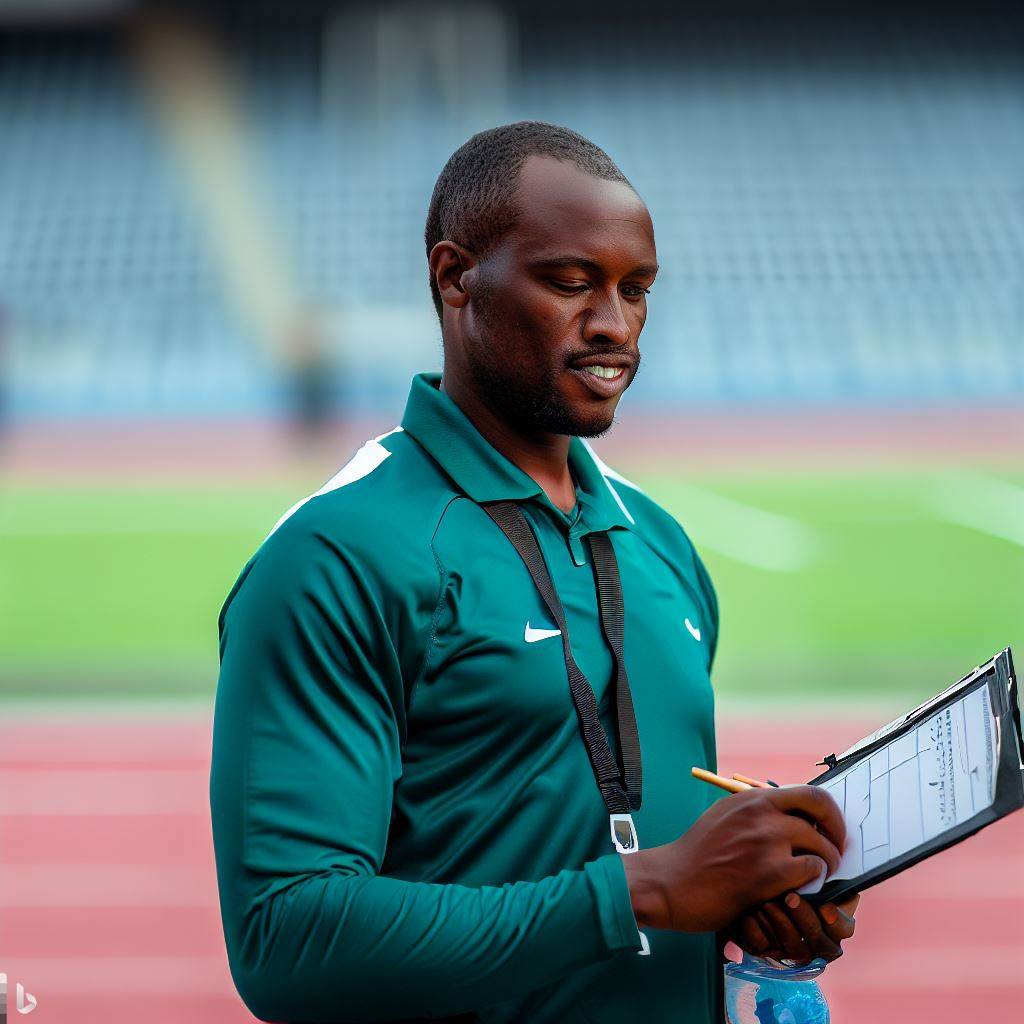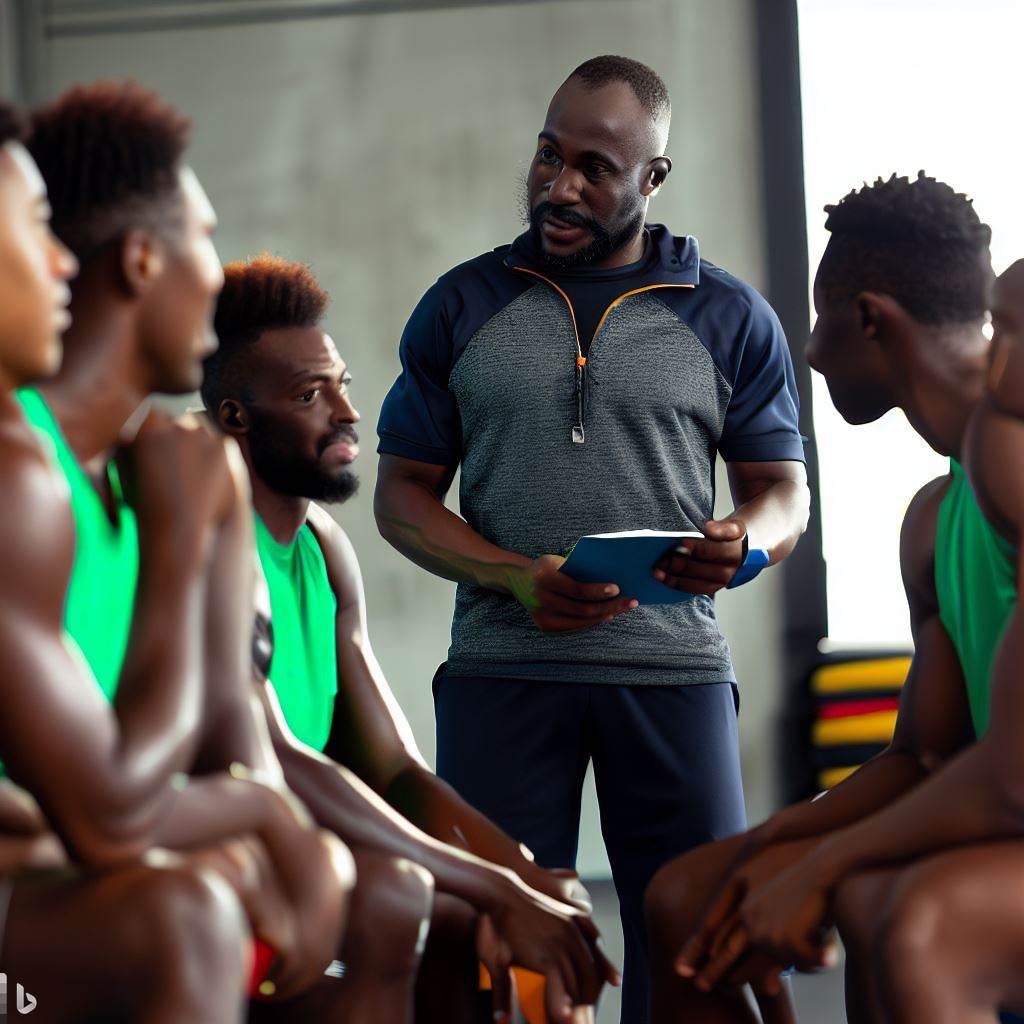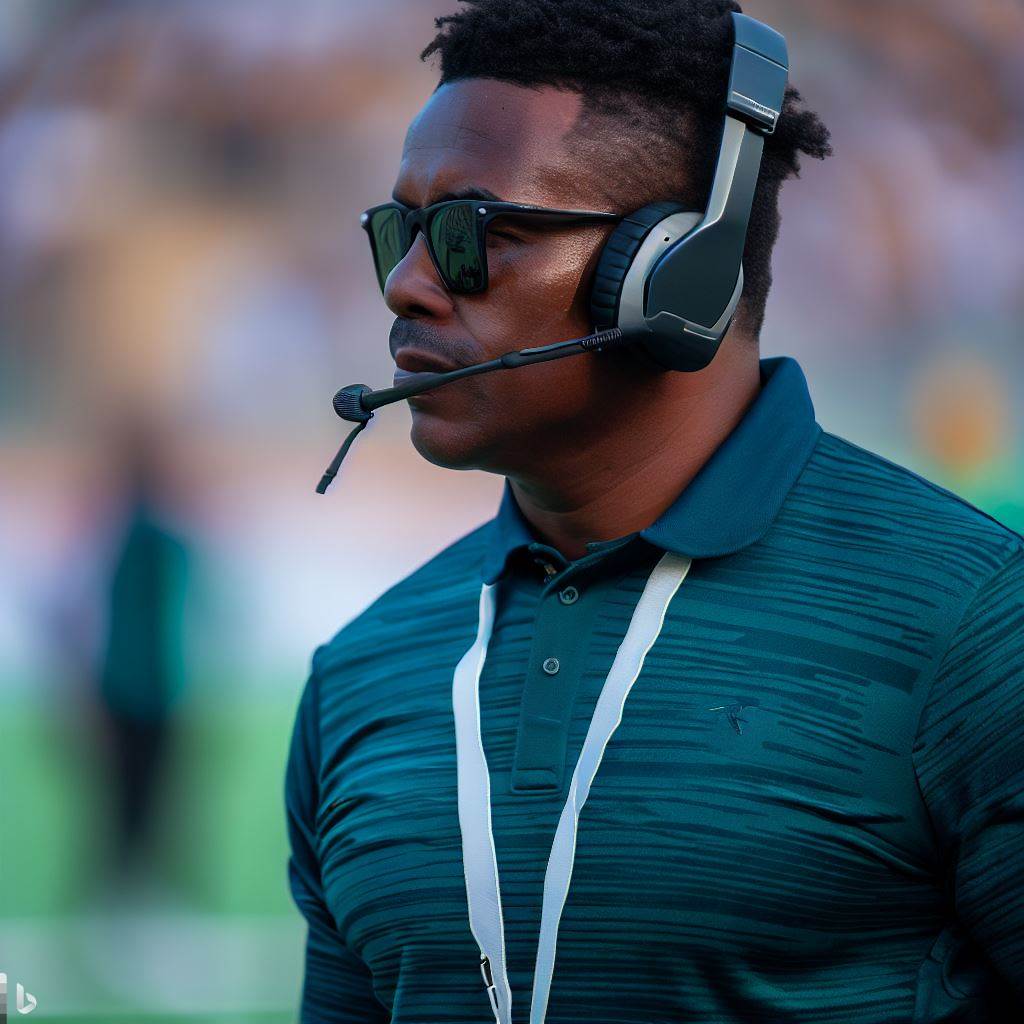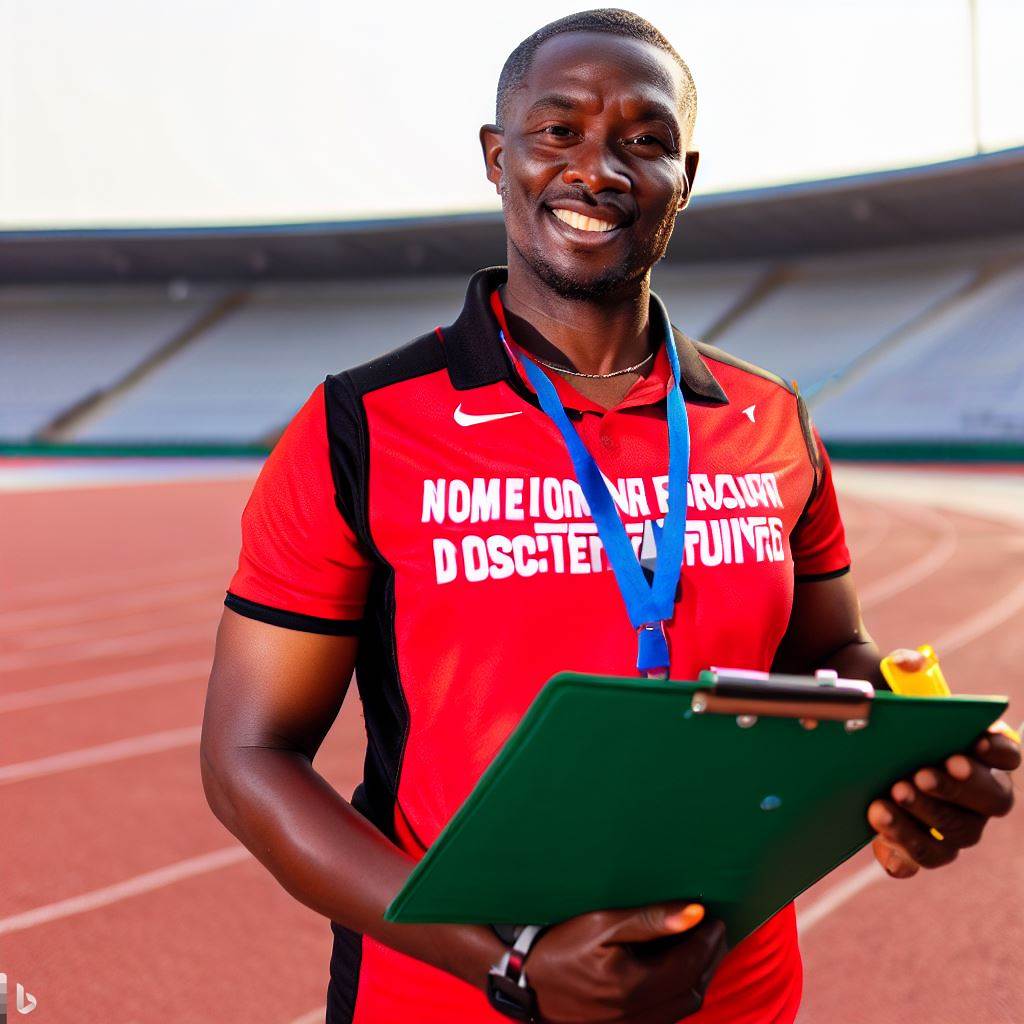Introduction
Assistant athletic trainers play a vital role in the sports industry by providing support to athletes.
In Nigeria, sports are a significant part of the cultural landscape, with a rich history.
It is crucial to examine the impact of assistant athletic trainers on Nigerian sports due to their importance.
Assistant Athletic Trainer: Definition and Responsibilities
Overview of Their Role
- Assistant athletic trainers play a crucial role in optimizing athletes’ performance and well-being.
- They work alongside head trainers, offering expertise in injury prevention, treatment, and rehabilitation.
- Athletic trainers ensure athletes are physically prepared, aiding in injury recovery, and promoting peak performance.
Background on Nigerian Sports Scene
Nigerian Sports Scene
- Nigeria boasts a diverse and vibrant sports scene, spanning football, athletics, basketball, and more.
- The nation has produced world-class athletes and achieved success on the international stage.
- Sports are deeply ingrained in Nigerian culture, making it a significant part of society.
The Importance of Discussing Their Impact
Significance of This Discussion
- It’s essential to acknowledge the contributions of assistant athletic trainers to Nigerian sports.
- Their expertise helps Nigerian athletes compete at the highest levels, enhancing the country’s sports reputation.
- This chapter sets the stage for exploring the remarkable impact assistant athletic trainers have on Nigerian sports.
Assistant athletic Trainers and their role in Sports
An assistant athletic trainer is a professional who works alongside the head athletic trainer in providing medical and rehabilitative services to athletes.
They play a crucial role in ensuring the overall well-being and optimal performance of athletes in sports.
Various responsibilities of assistant athletic trainers
Injury prevention and assessment
- Assistant athletic trainers are responsible for implementing injury prevention programs and techniques to minimize the risk of injuries during sports activities.
- They conduct regular assessments to identify potential risks and offer recommendations for improving athletes’ safety
Treatment and rehabilitation
- Assistant athletic trainers assist in the treatment and rehabilitation process of injured athletes.
- They provide immediate care for injuries on the field, administer appropriate first aid, and develop individualized rehabilitation programs to help athletes recover and return to their sport.
Education and counselling
- Assistant athletic trainers educate athletes about various health-related topics such as nutrition, hydration, and injury prevention methods.
- They also offer counseling and guidance to athletes on managing stress, maintaining a healthy lifestyle, and adhering to proper training techniques.
Performance enhancement
- Assistant athletic trainers work closely with athletes to enhance their overall performance.
- They create personalized conditioning programs, provide guidance on strength and flexibility training, and analyze athletes’ movement patterns to identify areas for improvement.
Assistant athletic trainers play a vital role in Nigerian sports by ensuring athletes’ well-being, preventing injuries, and enhancing their performance.
Their dedication and expertise contribute significantly to the success of athletes and sports teams in Nigeria.
Read: Nigeria’s Assistant Coach Certification Explained
Nigerian Sports Landscape
Overview of Popular Sports in Nigeria
In Nigeria, sports are an integral part of the culture, with several popular sports capturing the nation’s attention.
- Football: Also known as soccer, football is undoubtedly the most popular sport in Nigeria.
- Basketball: Basketball has gained significant popularity, especially following Nigeria’s success on the international stage.
- Athletics: Nigeria has produced exceptional track and field athletes who have achieved global recognition.
- Boxing: Boxing holds a special place in Nigerian sports history, with many prominent boxers emerging from the country.
- Wrestling: Traditional Nigerian wrestling, known as “Luta,” has deep cultural roots and remains popular in many regions.
Competitiveness and Popularity of Nigerian Sports
Nigerian sports are highly competitive and have gained widespread popularity due to the nation’s prowess in various disciplines.
Football, in particular, captures the hearts of millions of Nigerians.
The national team, nicknamed the Super Eagles, has achieved remarkable success in international competitions, including multiple African Cup of Nations triumphs.
Nigerian footballers are also well-represented in top leagues around the world.
Basketball has experienced a resurgence, with Nigerian players making a significant impact in the NBA.
The national basketball team, known as D’Tigers, has showcased its competitiveness by defeating top-ranked teams in major international tournaments.
Athletics has been a consistent source of pride for Nigerians. Iconic athletes like Chioma Ajunwa, Blessing Okagbare, and Hakeem Olajuwon have brought fame to the country with their exceptional performances.
Despite the achievements, Nigerian sports still face numerous challenges.
Challenges Faced in Nigerian Sports
Nigerian sports face various challenges that hinder their development and progression on both national and international stages.
- Lack of Resources: Insufficient funding and resources limit the capacity to adequately support athletes and provide quality training facilities.
- Inadequate Infrastructure: The lack of proper sports infrastructure, stadiums, and training centers hampers the overall growth of Nigerian sports.
- Inconsistent Policies: Inconsistent policies and a lack of long-term planning hamper the sustained development of sports in the country.
- Corruption: Corruption within sports bodies can divert funds meant for athletes’ welfare, undermining their progress.
- Limited Opportunities: Limited opportunities for young athletes, particularly in grassroots development, prevent the full potential of Nigerian sports from being realized.
Addressing these challenges is crucial to ensure continuous growth and success in Nigerian sports.
In essence, Nigerian sports encompass a wide range of popular disciplines, including football, basketball, athletics, boxing, and traditional wrestling.
These sports have gained significant competitiveness and popularity, with Nigerian athletes excelling globally.
However, challenges such as lack of resources, inadequate infrastructure, inconsistent policies, corruption, and limited opportunities hinder the progress of Nigerian sports.
By addressing these challenges, Nigeria can further elevate its sports landscape and provide a platform for athletes to thrive.
Read: Internships in Nigeria for Aspiring Athletic Trainers
Need for Assistant Athletic Trainers in Nigerian Sports
Potential Benefits of Having Assistant Athletic Trainers in Nigerian Sports
- Improvement in the overall healthcare and well-being of Nigerian athletes
- Enhancement of injury prevention strategies and reduction in the risk of sports-related injuries
- More efficient management and treatment of injuries, leading to faster recovery times
- Increased athlete confidence and morale, resulting in improved performance on the field
- Opportunities for specialized training and skill development for assistant athletic trainers
Current Absence or Limited Presence of Adequately Trained Athletic Trainers in Nigerian Sports
- Lack of awareness and understanding regarding the importance of athletic trainers in sports
- Inadequate funding and resources allocated towards the training and employment of athletic trainers
- Limited availability of educational programs and opportunities for aspiring athletic trainers in Nigeria
- Reliance on unqualified or underqualified personnel for sports-related healthcare needs
- Underestimation of the role of athletic trainers in preventing and managing injuries
Inclusion of Assistant Athletic Trainers and Overall Development of Nigerian Athletes
- Improved performance and potential for success at national and international sporting events
- Empowerment of Nigerian athletes through personalized care and attention from assistant athletic trainers
- Development of a strong sports medicine infrastructure in Nigeria
- Elevation of the status and professionalism of sports in Nigeria through the inclusion of trained professionals.
- Positive impact on the reputation and image of Nigerian sports on a global scale
Overall, the inclusion of assistant athletic trainers in Nigerian sports is imperative for the overall growth and success of Nigerian athletes.
The potential benefits include improved healthcare, injury prevention, efficient injury management, enhanced performance, and specialized training opportunities.
Currently, there is a lack of adequately trained athletic trainers in Nigerian sports due to various factors such as lack of awareness, insufficient funding, limited educational programs, and reliance on unqualified personnel.
By recognizing the importance of assistant athletic trainers and investing in their training and employment, Nigeria can contribute to the overall development and success of its athletes, establish a robust sports medicine infrastructure, and elevate the country’s reputation in the global sports arena.

Examples of Successful Implementation of Assistant Athletic Trainers in Nigerian Sports
Showcase success stories of Nigerian sports teams/athletes with access to assistant athletic trainers
- The Nigerian national football team, known as the Super Eagles, experienced significant improvements after hiring assistant athletic trainers.
- With the expertise of assistant athletic trainers, the Super Eagles reduced the occurrence of injuries and improved player recovery time.
- The Nigerian women’s basketball team, also known as D’Tigress, achieved remarkable success with the assistance of athletic trainers.
- D’Tigress won multiple African championships and qualified for the Olympic Games due to the support and guidance of assistant athletic trainers.
- Individual athletes like Blessing Okagbare, a Nigerian track and field sprinter, have seen immense progress in their performance with the aid of assistant athletic trainers.
Positive impact on athlete performance, injury management, and overall team success
- Assistant athletic trainers play a crucial role in optimizing athlete performance by providing specific training regimes and tailored workout plans.
- They oversee the athletes’ physical conditioning, focusing on strength, endurance, and flexibility to enhance their on-field performance.
- Effective injury management by assistant athletic trainers ensures athletes receive immediate care and appropriate rehabilitation, minimizing their time on the sidelines.
- Quick and proper treatment enables athletes to return to training and competitions swiftly, contributing to overall team success.
- Assistant athletic trainers also educate athletes on injury prevention strategies, such as proper warm-ups, stretching routines, and maintenance exercises.
Role of assistant athletic trainers in elevating Nigerian sports to an international level
- The presence of assistant athletic trainers has raised the standard of Nigerian sports to compete at international levels effectively.
- Their expertise in sports science, nutrition, and injury prevention has enabled Nigerian athletes to perform at their peak during international competitions.
- Assistant athletic trainers have helped Nigerian sports teams and athletes gain recognition on the global stage through improved performance and achievements.
- The incorporation of modern training methods and advanced sports science knowledge by assistant athletic trainers has elevated the overall quality of Nigerian sports.
- The positive results achieved by Nigerian sports teams and athletes with the aid of assistant athletic trainers have garnered international attention and acclaim.
In summary, the implementation of assistant athletic trainers in Nigerian sports has yielded significant success stories.
Nigerian teams and athletes, such as the Super Eagles, D’Tigress, and Blessing Okagbare, have experienced notable improvements in their performance and achievements.
These assistant athletic trainers have positively impacted athlete performance, injury management, and overall team success.
Their expertise has elevated Nigerian sports to an international level, gaining recognition and acclaim worldwide.
Read: A Day in the Life of an Assistant Coach in Nigeria
Discover More: The Role of Women as Sports Information Directors in Nigeria
Benefits of Investing in Assistant Athletic Trainers in Nigerian Sports
Direct and indirect benefits of Hiring Assistant Athletic Trainers in Nigerian Sports
1. Increased athlete safety: Assistant athletic trainers play a crucial role in preventing and managing injuries during sports activities.
2. Enhanced performance: With regular monitoring and guidance from assistant athletic trainers, athletes can optimize their physical condition and improve their performance.
3. Timely injury detection and treatment: Assistant athletic trainers can quickly identify any potential injuries and provide immediate treatment, preventing further damage.
4. Efficient rehabilitation: These trainers assist athletes in the recovery process, utilizing specific techniques and exercises to ensure faster and more successful rehabilitation.
5. Injury prevention programs: Assistant athletic trainers develop customized programs that target specific areas of concern, reducing the risk of injuries for athletes.
6. Support for proper nutrition: These trainers provide valuable advice on proper nutrition, helping athletes maintain a healthy and balanced diet to optimize their performance.
7. Mental health support: Assistant athletic trainers promote mental well-being by offering guidance and support to athletes, especially during periods of stress or competition.
8. Educational opportunities: By working closely with assistant athletic trainers, athletes can gain knowledge about injury prevention, recovery, and overall health management.
Potential positive effects on athlete health, performance, and career longevity
1. Improved physical condition: With the assistance of athletic trainers, athletes can maintain peak physical fitness, reducing the risk of injuries.
2. Enhanced performance levels: Assistant athletic trainers aid in maximizing athletes’ potential through personalized training programs.
3. Faster recovery: Due to the expertise of athletic trainers, athletes can recover from injuries more quickly, minimizing time away from training and competition.
4. Increased longevity: With proper guidance and injury prevention strategies, athletes can extend their careers, competing at a high level for a longer period.
5. Long-term health benefits: Assistant athletic trainers provide education on preventive measures, ensuring athletes adopt healthy practices that support their well-being beyond their sports career.
Economic benefits associated with reduced medical expenses and improved brand image
1. Reduced medical expenses: By investing in assistant athletic trainers, sports organizations can minimize medical costs associated with treating injuries and prolonging athletes’ careers.
2. Lower insurance premiums: As the number of injuries decreases, insurance premiums for sports organizations can decrease, resulting in financial savings.
3. Enhanced brand image: Sports organizations that prioritize athlete safety and well-being through the employment of assistant athletic trainers gain a positive reputation, attracting sponsors and supporters.
4. Increased revenue: A positive brand image combined with reduced injuries and improved performance can attract more spectators and television viewers, leading to higher revenue streams.
5. Economic growth: Supporting the sports industry with assistant athletic trainers can create employment opportunities and contribute to the overall economic growth of Nigeria.
Investing in assistant athletic trainers in Nigerian sports not only safeguards athletes’ well-being but also yields significant direct and indirect benefits.
With improved athlete health, optimized performance, reduced medical expenses, and a positive brand image, the Nigerian sports industry stands to prosper.
Read: Challenges in the Sports Nutrition Field in Nigeria
Explore Further: Athletic Trainer Equipment in Nigeria: What You’ll Need
Delve into the Subject: Steps to Building a Career in Nigeria’s Sports Field
Conclusion
Assistant athletic trainers play a crucial role in Nigerian sports, ensuring the well-being and optimal performance of athletes.
It is essential to increase investment and support for the inclusion of assistant athletic trainers in Nigerian sports to enhance athlete development.
I urge all relevant stakeholders to recognize the significance of assistant athletic trainers and support their integration for the advancement of Nigerian athletes.
Importance in Nigerian Sports
- Assistant athletic trainers are the unsung heroes, ensuring athletes’ peak performance and injury prevention.
- They contribute significantly to Nigeria’s sports success, often behind the scenes.
Encouraging Investment and Support
- It’s crucial to invest in more assistant athletic trainers for comprehensive athlete care.
- Adequate support can elevate Nigeria’s sports performance and reputation on the global stage.
Call to Action
- Stakeholders, recognize the significance of assistant athletic trainers in athlete development.
- Support and invest in these professionals to propel Nigerian sports to new heights. Our athletes deserve it.




